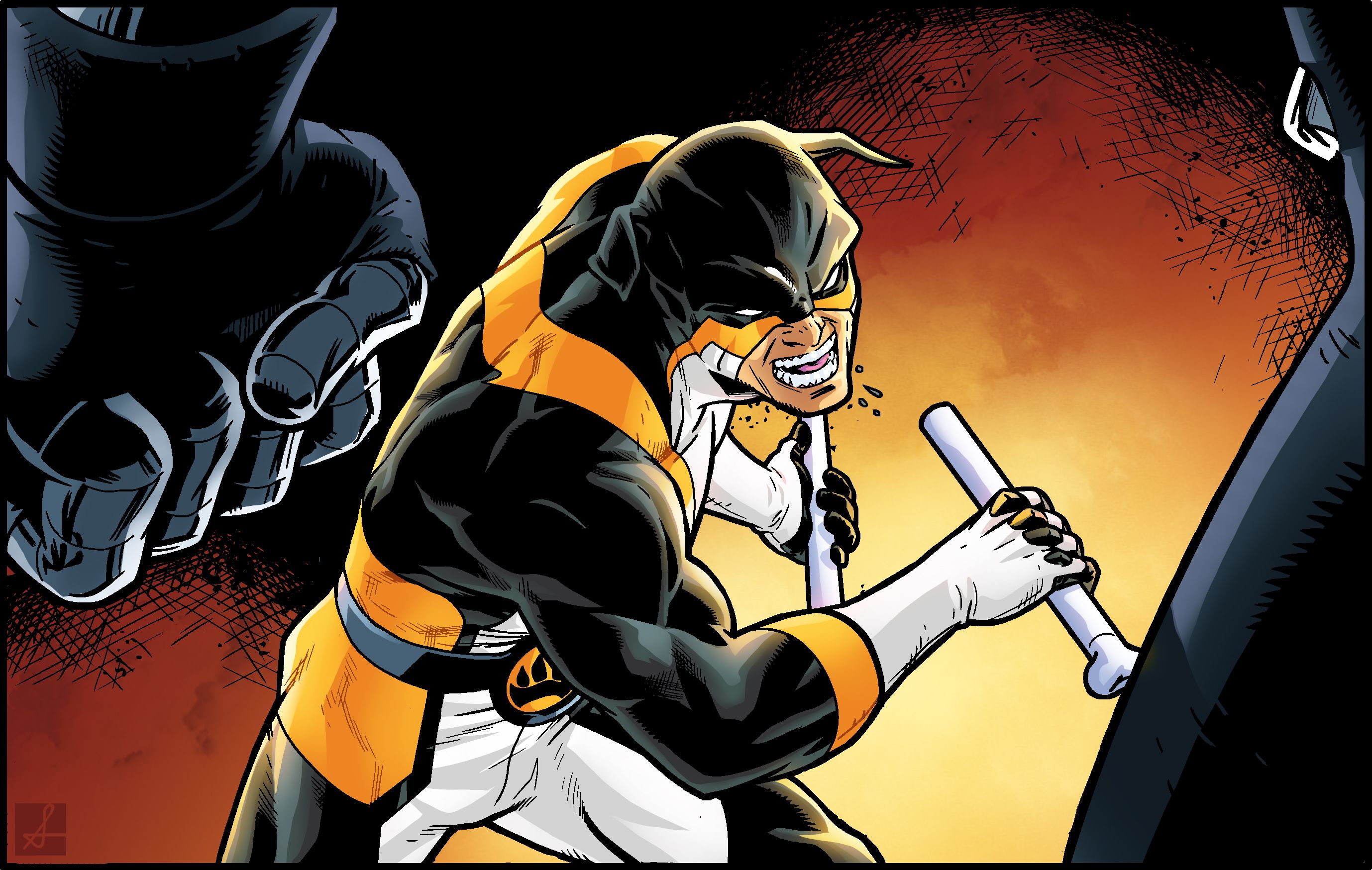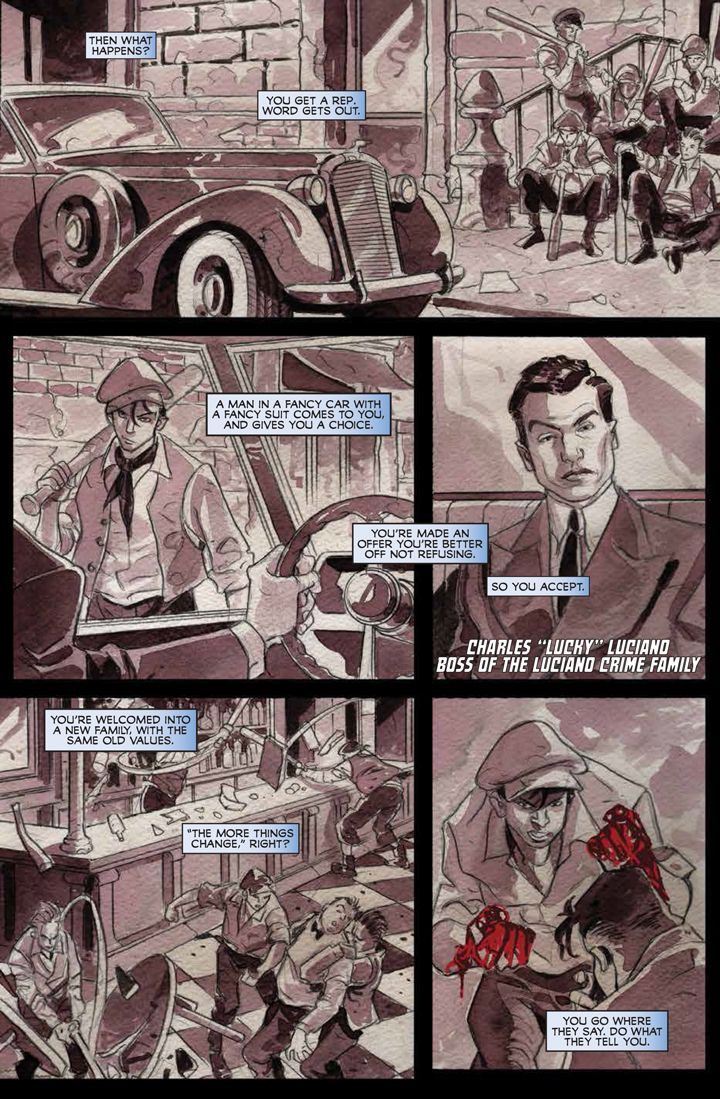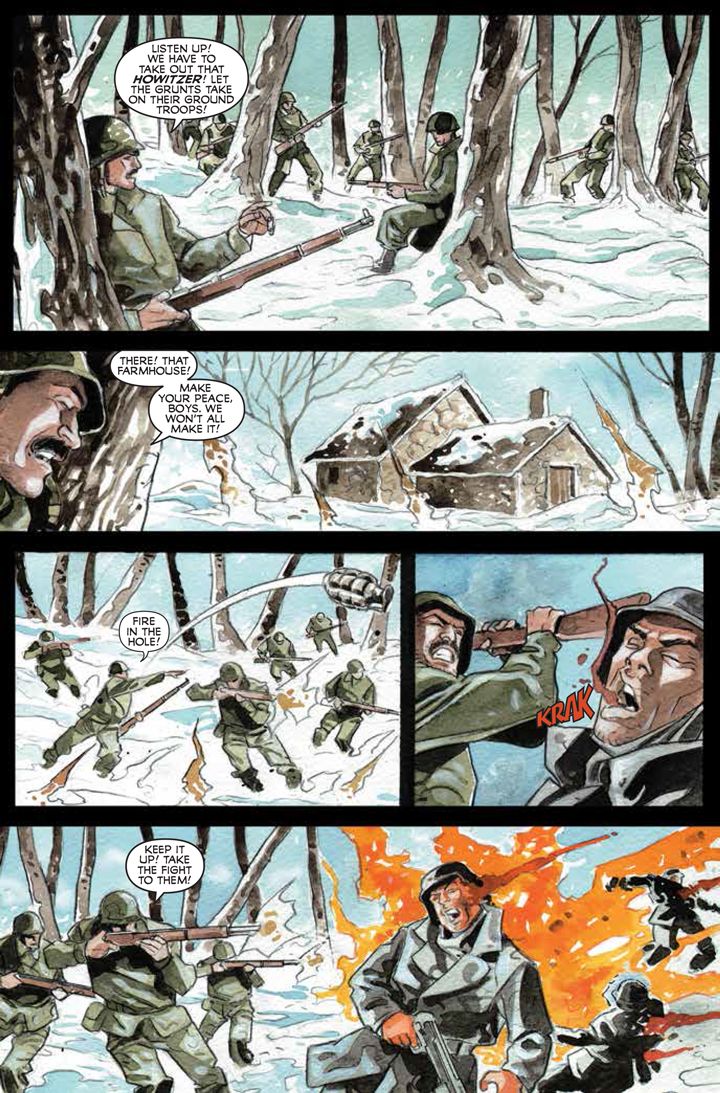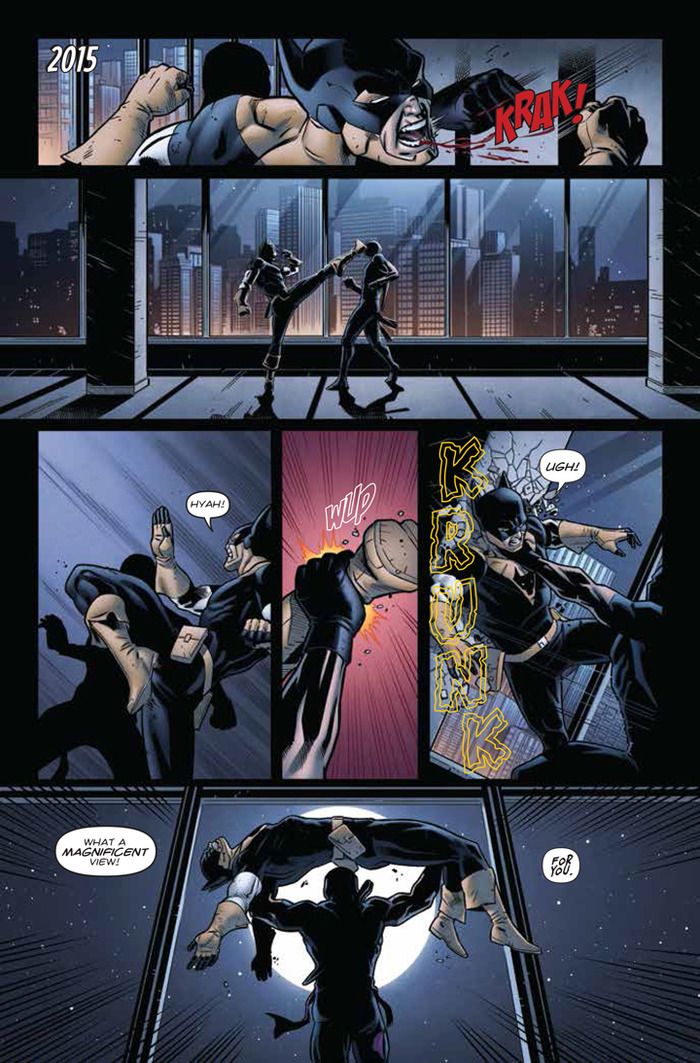In 2011, Vito Delsante left the relative comfort of a full-time job at Jim Hanley's Universe to pursue a career in writing comics. While he's no stranger to that side of the medium, having written titles like the self-published FCHS and DC's Batman Adventures, this year could prove his most ambitious, as he has two projects in the works -- World War Mob from New Paradigm Studios, with artist Giancarlo Caracuzzo, and Stray, currently up on Kickstarter, with artist Sean Izaakse.
I spoke with Vito about both projects, as well as his comic-reading history, what he learned as a retailer and more.
JK Parkin: Before we get into the two projects you have going on right now, Vito, I thought we'd start with some "get to know you" questions. What's the first comic that you can remember that really turned you onto the medium?
Vito Delsante: This seems like a two-pronged answer; how did I discover comics as a reader and how did I discover comics as a creator. Or, rather, what turned me on to comics as a creator. So, the first one ... it wasn't a comic. It was the Batman TV show. It was on in reruns at that point, and it would come on after Bozo here in NYC, which was timed almost perfectly for my return home from school. That led to my interest in everything Batman, everything Super Friends, and therefore, everything DC. My dad would buy me the odd Batman comic here and there and occasionally, a Flash comic (which I have no idea why I got them, or why I was interested, but there it is). Marvel came to me ... I watched the Spider-Man cartoon from the '60s, the Kirby-ish animated Marvel Superheroes (which I also had on a ViewMaster), but the Amazing Friends is what led me to buying Marvel Comics. Specifically, the X-Men episode/Firestar origin.
As a creator ... I was just talking to Caleb Monroe, one of my best friends and a great writer himself, about how, growing up, I knew the names Chris Claremont, John Byrne, Terry Austin, Tom Orzechowski, Glynis Oliver, Louise Simonson ... but didn't really consider comics as a viable form of employment. I read comics throughout high school (which was no small task growing up in a town without a comic store; I had to get them at a Hallmark card store that had a newsstand), throughout college, and beyond. It was reading Starman by Robinson and Harris that made me consider this route. The fact that you could write a story that wasn't straight up rock 'em, sock 'em stories. I point at that series as being the most important in my development as a creator and reader because ... those that have never read it won't understand this, but ... it's not a superhero story. I know it's a "___man" story, which leads you to think otherwise, but that book probably was responsible for me looking into Fantagraphics, Top Shelf, Alternative ... because it didn't read like a typical cape and tights comic.
I know neither of these projects is your first, so can you give me an overview of some of your previous work?
I've worked for DC, Marvel, Dynamite ... just about everyone at this point. Highlights are writing Batman Adventures with Dean Haspiel, self-publishing my high school teen sex dramedy FCHS, writing a Superman issue that was sandwiched between Kurt Busiek and James Robinson.
I know at one point you worked for Jim Hanley's Universe, the New York City comics retailer. Are you still there? What lessons from your comic retailing experience have helped as you've worked on both Stray and World War Mob?
I left Jim Hanley's Universe (which is now known as JHU Comics) in December of 2011. Hardest decision I ever made because the safety net was gone. And I struggled for an entire year. Actually, a year and one week. My wife Michelle got pregnant in that same year, so it was really tough. Really tough. It worked out, thankfully.
Working there was a great experience. I wish every creator could work in retail for some stretch of time because it's invaluable market research. You get to see how the industry works at the point of purchase. What books are selling? Why? I worked with a guy, Harry, who once said that comics with red covers always sell better than comics with dark blue or black covers. And we did the math. He wasn't wrong. Why is that important? I don't know, but that's the kind of thing that working in a store gets you instead of just jumping into comics.
So did you leave JHU specifically to focus yourself on your writing career?
Yeah, pretty much. I can't remember who said it, but I remember reading in, of all places, Wizard Magazine, an interview with writers about how to write. I'm pretty sure it was Chuck Dixon, but what the person said was, ostensibly, "Make sure you marry someone who will be strong for both of you." And I'm sure to some that means, "Make sure you have someone who will carry you financially," but that's not how I see it. Michelle is, in many ways, my business manager. Not in a corporate sense, but she has a great investment in my success. So she works toward that end WITH me. She was with me at my table at NYCC and she was selling, as crazy as this sounds, our brand. She is the one that told me, "If you don't leave now, you'll never leave." So, she put me on my path.
Getting into the projects now ... what's the premise of World War Mob?
The elevator pitch is, "The mob takes out a hit on Benito Mussolini." It's based on a story I was told by my grandfather, which, and this has to be said outright, I was led to believe was true. If it is or isn't, I don't know; my grandfather died in 1990. But we're saying that WWM is "inspired by true events" because I fictionalize a few things here and there. It's being described as The Godfather meets Kelly's Heroes or Inglorious Basterds meets Goodfellas. It is a crazy-so-crazy-it-might-be-true romp. Lots of fun, lots of blood.
What's the format and how long are you anticipating the story being?
It's four issues, 20 pages of story with supplemental material as well. There is a sequel. The story I was told was told to me for a reason, and that reason becomes apparent in the (theoretical) second volume. But we'll see how well the first volume goes.
How did you end up working with New Paradigm Studios?
I've known my assistant editor, Zack Rosenberg, for about three or four years. I can't remember how I knew that he was involved with NPS, but just out of the blue, I said, "Hey, we should work together." He agreed, so I sent him a few loglines ... maybe five or six ... and he and the NPS editorial staff just picked and chose the ones they liked. One of them was World War Mob. And then we just went to work.
Turning now to your other project, Stray -- you've got this one up on Kickstarter right now, but it's also going to be published by New Paradign, correct? Did you know they would be publishing it before you started the campaign?
This is a weird one because, yes, they are the "publisher" of the book, but it's not as easy or cut and dry as that. They are serving as our distributor, in a way, facilitating the book getting into the direct market via Diamond. Call them the sponsors of the book, in a way. But we're treating the book as if it is being self published. So, that's why we're doing a Kickstarter; to pay for the art team. We slapped their logo on there because there is a sign of good faith that if we get the book funded, they will be our publisher.
What's the premise of Stray?
The premise is ... this goes back to what I was saying about Starman, and how that book is more than just costumes or cosmic rods or whatever. Stray is about a young man, Rodney, who was a sidekick. He quits and his life falls apart somewhat. His mentor is killed, and he is suddenly dragged back into the world of capes and heroes and villains. If you strip all of that away, powers, costumes, etc., and what you have is the story of how I dealt with my father's death. I've never been shy about talking about it, but Fraction's response to that reader regarding suicide makes this a little easier to say out loud. I was 15 when my father died, and that is, by all accounts and by all experiences, a rough time to lose a parent. I didn't take it so well. I had those thoughts in my head, but I was not so ... proactive about ending my life. I wanted to die, every day. Every day. I remember walking to school one morning, and it was a pretty gray day. Maybe winter. And I just wanted to walk into traffic. Just to see what would happen. Thoughts like that every day. That's not to say that I didn't experience happiness or love or good times. It's just a fact. Post high school, I started drinking. Post dropping out, I experimented with a few drugs ... and not the gateway ones. There was an element of self destruction that I was, for lack of a better word, attracted to. Or used to. And I am being 100% honest when I say that I don't remember how I snapped out of it, but eventually I did. It might have been 9/11, or it might have been something else. I woke up. It worked out. Going back to Stray, that's what ... that's the story I'm trying to tell. It's veiled somewhat, but it's all there. And there's a mystery, too. It's incredibly personal, but it's not all that obvious upon first glance.
Wow, I wasn't expecting an answer that went that deep. I'm glad it worked out, though, and you snapped out of it.
Like I said, it's nothing I've ever hidden, but I don't think I've ever really talked about it in public before. What's interesting is ... Stray was supposed to be something different, when I first plotted it out. It was a typical street-level urban vigilante who, in some ways, resembled Nightwing. Some of that still exists in it, but in the writing, while scripting it out, more of me started coming out. More of my personality and anecdotes, and when it was pointed out to me, I went back, reread it and realized that what I was doing was telling an autobiography with costumes and capes. Just about every story I write or have written deals with absolution. Getting these feelings and thoughts off your chest and onto the page. I've long held that comics, specifically superhero comics, can tell stories that have nothing to do with super powers. They, like all other mythology, can be used as allegorical life lessons. With Fraction's blog and Dean Trippe's Something Terrible, it seems as good a time as any to lay my soul bare. And keep in mind, these scripts weren't written in the last month. Stray has existed for years, written in full. It's just pretty good timing that this is all happening at the same time.
And you know, you're a father. As a father, all I ever want to do is leave my daughter with life lessons. I'm just using my comics to tell them. When she's 16 and, God forbid, she's being picked on or harassed or bullied, I want her to read Stray and see that not only did the character make it to the other side of his depression OK, but so did her dad.
If I'm not mistaken, this is your first Kickstarter. What have you learned, and what do you wish you had known when it started?
Actually, this is the second Kickstarter I've been a part of (the first being Matt Miner's Liberator, which I lettered), but it is the first one that I was responsible for. This is hard to answer because we're just two weeks old, and I'm still learning. I'm fortunate to know some great folks in the industry. Guys with rabid fan bases that have, inexplicably, gone to bat for me and given me great advice as we go forward. I think the most important lesson, the one I have to keep reminding myself (and remember, we're just two weeks in) is that this is a marathon, not a race. I'm working pretty hard at this; in many ways, this is a part time, even a full-time, job that is taking the majority of my time. And I have expectations that are, in many ways, unrealistic, but I put myself to that standard. It's hard work, and I'm willing to work hard. It's just ... I'm a little hard on myself. But one of the things I was told was to thank all of my backers, which I've done and kept current on. And getting everyone's feedback from those...I've just been telling them, "Look, I will not let you down. You will enjoy this story," and they've all, almost to the person said, "I know! It looks great!" So, I feel like ... some of that might seem like setting unrealistic expectations, but I think it just goes back to me saying this is something I'd back if I weren't doing it. I set out to write a story that only I could write, and I think I've accomplished that. I think this is a story that only Sean could draw, and Simon and Ross are the only two that could color this, etc. It feels unique. And that's probably the other thing I've learned ... yeah, this looks like Batman or a similar story, but I don't think you could tell this story with Batman or Nighthawk or whoever. This is a completely unique experience. If the idea of Kickstarter is to "give the people what they want, directly," then I think that's what we're doing.
How did you and Sean first meet?
I'm sure I'm missing a detail, but as I remember it, I was a fan of his work on deviantArt. Clean lines, great design ... he just seemed to be all about character commissions than he was sequential art. I commissioned him to do a RetroFix on Project Rooftop with me (of Basil Wolverton's Spacehawk, whom we now call Hyperion) and we just got along so well, we just ... kept talking. Michelle would always ask, "Did you talk to your boyfriend today?" because we were on Skype at least once a week. And then I just asked him if he was willing to do Stray Volume 2 (there are four planned) and he said yes. We had another artist originally (and another publisher), but that didn't work out. While Stray was falling apart, Sean and I were working on a book that we're now calling I Am Black Viper (which is based on my 30 Creative Common Characters versions of Black Cobra). So, the original artist was let go, taking his designs with him (with my blessing) and I asked Sean if he wanted to jump on Stray. And he did. He jumped in and we've been redesigning characters, starting the process of getting the book together (with Ross A. Campbell and Simon Gough on colors) and ...
Sean has jumped up, in my eyes, as a creator that, if I could, I would only work with him for the rest of my career. Like Dean Haspiel. Dean is someone I could see as my constant collaborator. Sean, without the benefit of ever having met in person (he lives in South Africa), has that same role with me. It's nice to know you can trust someone to see your vision through. Again, there are few artists I afford that trust to. Sean is definitely one of them.
What will happen if the Kickstarter doesn't meet its goal?
I'm not going to be coy or whatever and say, "Failure isn't an option," or, "I haven't thought of that; I'm too focused on blah blah blah." If this doesn't work out, we'll try again. Sean is incredible. He believes in the project. But just having his art out there in a Kickstarter is an invitation for him to get poached by a publisher (or even another Kickstarter). If we fail, I lose him for a little while. Stray, for me, is an important story. On the surface, yeah, it's just superheroes with cool costumes fighting. I've laid bare the underlying themes, and maybe that stuff isn't enough to get the book the attention it deserves. And it does deserve it. I've said this is a story I'd want to read and that I'd throw money at if I wasn't doing it. I don't think we will fail. I think it's going to carve it's own niche. But, and this is just me being realistic, if it does fail ... I'll be depressed about it for a week, lock myself away and avoid all internet contact or phone calls out of embarrassment, and after seven days, get back to work. Stray gets moved to the back, something else gets moved to the front. That's how we deal with these things. Right now, 160 people believe in Stray, but I think that at least half of them? Half of them believe in Sean and me. Failure, in this sense, isn't the end.
Below: two pages from World War Mob, and one from Stray






